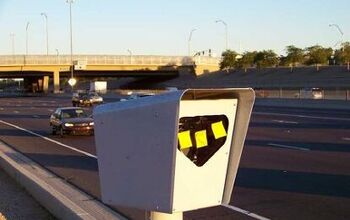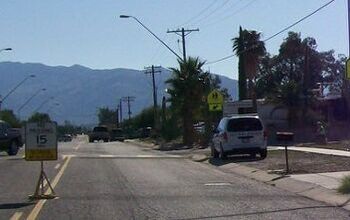Arizona: The Speed Cameras Come Down
Tickets are no longer being mailed based on evidence created by freeway speed cameras in the state of Arizona. After a year-long campaign against the devices, activists from the group CameraFraud.com succeeded in convincing Governor Jan Brewer (R) to end the photo enforcement contract that her predecessor, Janet Napolitano (D) signed. As a result, the cameras were remotely shut down at 12:00am today.
In January 2008, Napolitano’s budget predicted that 100 speed cameras would issue $165 million worth of tickets by 2010. Only 36 fixed and 42 mobile cameras were ultimately used, and the Australian company in charge of the program, Redflex Traffic Systems, mailed 1,105,935 tickets worth $200,727,202. Unfortunately for the state budget, two out of three recipients threw their citations in the trash on the advice of groups like CameraFraud and newspapers like the Phoenix New Times who correctly pointed out that unserved tickets were invalid. Only 432,367 citations were paid.
Photo enforcement advocates insist that taking down the cameras will result in a ten-fold increase in speeding and accidents. Opponents counter that the other side is making false claims to protect a highly profitable enterprise.
“The spokesman for Redflex is throwing out bogus figures in an attempt to fool the public into fearing other drivers on the road — it’s pure desperation,” CameraFraud’s Shawn Dow told TheNewspaper. “Arizona’s photo radar program was a complete failure. Neither Janet [Napolitano] nor the cameras are welcome back in Arizona.”
As an example of the false claims, Redflex and DPS both claimed that the freeway photo radar program was the first of its kind in the US, with the claim blindly repeated in publications such as the New York Times and Arizona Republic. In 2001, the state of Hawaii signed a contract with a different Arizona company to run freeway speed cameras. The “talivans” as they were popularly known sparked such a revolt that the legislature had no choice but to end the program prematurely. Illinois started its own modest freeway camera program more than a year before Arizona’s program started.
The same backlash that hit Hawaii struck in Arizona, and Dow intends to bypass the state legislature and use the local initiative process to shut down the remaining municipal cameras on a city-by-city basis. His first target is Paradise Valley, which is not the oldest speed camera program — speed cameras were operational in Texas in the 70s — but rather the oldest program that is still operating. According to Dow’s figures, a majority of the city’s registered voters signed the statewide petition to end photo radar. The localized version of the initiative now includes a provision calling for the refund of all camera citations collected.
“Paradise Valley is going to pay the price for twenty-three years of scamming the citizens out of their money,” Dow said.
Dow hopes to get several local initiatives on the November ballot, joining four confirmed ballot votes in cities as large as Houston, Texas. By November 2011, he predicted there would be no more speed or red light cameras in the state of Arizona. Photo enforcement has never survived a public vote.
[Courtesy: thenewspaper.com]
More by The Newspaper
Latest Car Reviews
Read moreLatest Product Reviews
Read moreRecent Comments
- MaintenanceCosts Poorly packaged, oddly proportioned small CUV with an unrefined hybrid powertrain and a luxury-market price? Who wouldn't want it?
- MaintenanceCosts Who knows whether it rides or handles acceptably or whether it chews up a set of tires in 5000 miles, but we definitely know it has a "mature stance."Sounds like JUST the kind of previous owner you'd want…
- 28-Cars-Later Nissan will be very fortunate to not be in the Japanese equivalent of Chapter 11 reorganization over the next 36 months, "getting rolling" is a luxury (also, I see what you did there).
- MaintenanceCosts RAM! RAM! RAM! ...... the child in the crosswalk that you can't see over the hood of this factory-lifted beast.
- 3-On-The-Tree Yes all the Older Land Cruiser’s and samurai’s have gone up here as well. I’ve taken both vehicle ps on some pretty rough roads exploring old mine shafts etc. I bought mine right before I deployed back in 08 and got it for $4000 and also bought another that is non running for parts, got a complete engine, drive train. The mice love it unfortunately.

































Comments
Join the conversation
Great report! And kudos to the Arizona and Hawaii residents who fought for what's just. To piggy back on George B (who's idea is pretty cool), I don't think giving tickets should be a revenue generating activity for governments. While I don't necessarily have a problem with governments using money from citations, I do have a problem with citations being given just to make money. Giving the revenue to charity would be great, but how about the police focus on protecting the public rather than measuring speeds. There's a lot of unsafe driving that goes on within the speed limit. I think writing speeding and (in the case of cities) parking tickets is emphasized because it's easier for cops to do then to look out for people who put the public safety at risk with dangerous driving. Cops should give out more tickets to people who dart in and out of lanes like they're in the grand prix... or how about the folks who can't put the cell phone down!
I foresee a camera problem in NJ soon. We have about 1000 state troopers destined for retirement in the next couple of years. There is no money to replace them - so who is going to write speeding tickets on the NJ Turnpike? The state will not let that revenue stream go away so easily. I predict in a few years we will have speeding cameras lining the roads of NJ. -ted